If you're trying to figure out which nuts have the most protein, this guide has got you covered. It has all the highest protein nuts you can eat, with as much as 24 grams of protein per serving!
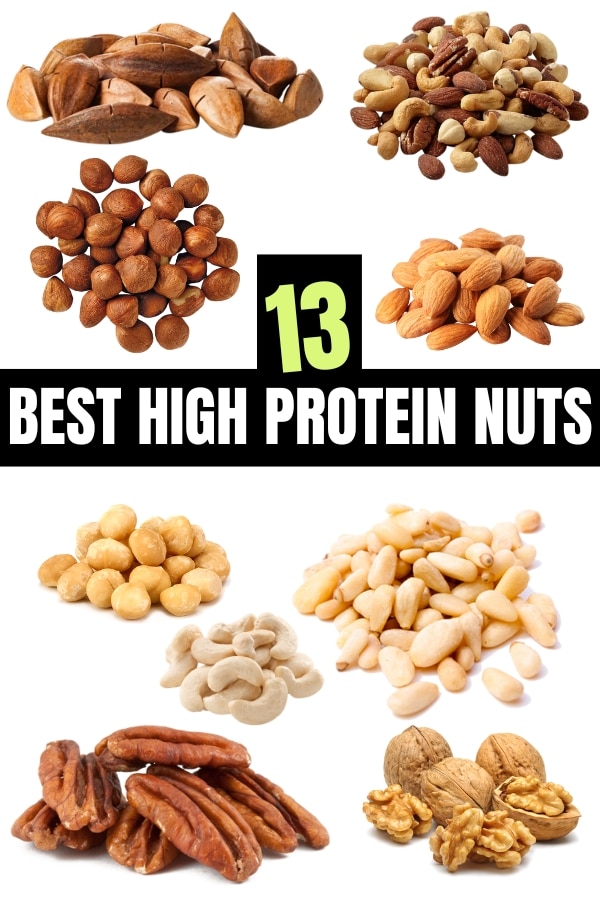
Table of Contents
Nuts With The Highest Amount Of Protein
Nuts are one of the best sources of plant-based protein you can eat, and in addition to their naturally high protein content, they're also an excellent source of healthy fats, essential amino acids, vitamins, and minerals, giving you all the more reason to incorporate them into your healthy diet!
That being said, when it comes to reaching your protein goals, it helps to know which nuts have the most of it. So, this list of protein-rich nuts ranks all the most popular nuts by their protein content to make it easier to meet your daily intake. Now, let's get right into it!
1. Peanuts

Nutritional Info for 100g, dry roasted:
- 587 Calories
- 49.7g Fat
- 21.3g Carbs
- 4.9g Sugar
- 8.4g Fiber
- 24.4g Protein
At the top of the list, peanuts are the highest protein nuts, with over 24 grams of protein per 100-gram serving. They're also a great source of heart-healthy fats and essential vitamins and minerals, particularly vitamin B3, an important nutrient for converting food into energy.
Besides whole peanuts, peanut butter is a popular option for boosting the protein content of shakes or smoothie bowls and generally has the same amount of protein per gram. If you want to cut back a bit on the calories, you can also try peanut powder as a protein-dense ingredient with less fat than the whole nut.
2. Almonds

Nutritional Info for 100g:
- 579 Calories
- 49.9g Fat
- 21.6g Carbs
- 4.4g Sugar
- 12.5g Fiber
- 21.2g Protein
Another popular choice, almonds are the second highest protein nuts and have more than 21 grams of protein in a 100-gram serving. What sets almonds apart from other nuts is their high fiber content, having over a third of the daily recommended dose of fiber. They're also rich in the antioxidant vitamin E, and just a handful of almonds make up half the recommended daily intake.
There are plenty of ways to get more almonds into your daily routine, including drinking almond milk, adding almond butter to your meals, or snacking on whole-roasted almonds. Almond flour is something I use all the time and is great for making low carb pancakes, pies crusts, bread, and more.
3. Pistachios
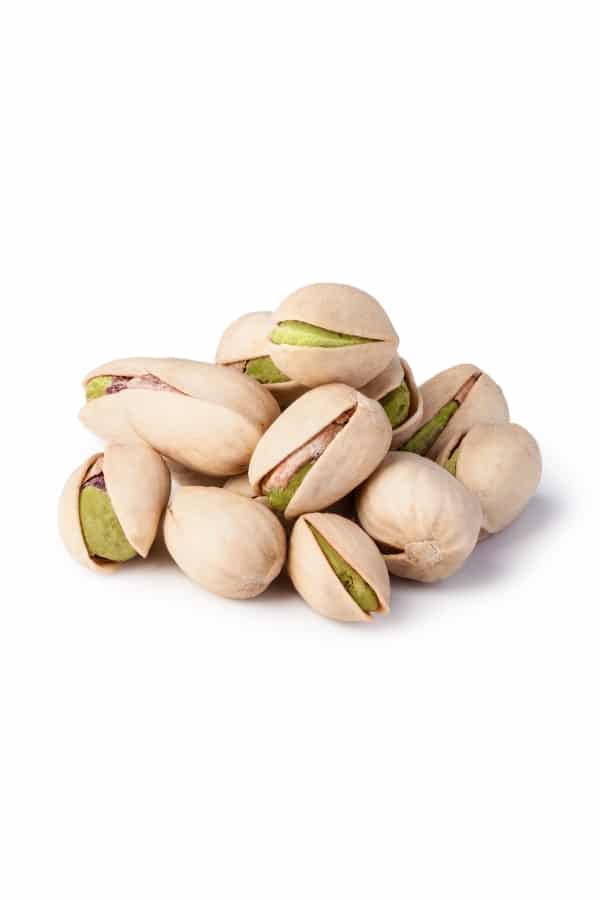
Nutritional Info for 100g, dry roasted:
- 572 Calories
- 45.8g Fat
- 28.3g Carbs
- 7.7g Sugar
- 10.3g Fiber
- 21.1g Protein
Pistachios are among the only nuts that are a complete protein, meaning they contain all nine essential amino acids. With almost the same amount of protein as almonds, pistachios provide a good amount of energy as well as a wealth of nutritional benefits. They're naturally rich in antioxidants, with even higher antioxidant activity compared to superfoods like blueberries and cherries.
Their mildly sweet taste and vibrant color make pistachios a favorite addition to baked goods, whether whole, crushed, or in the form of nut butter.
4. Mixed Nuts
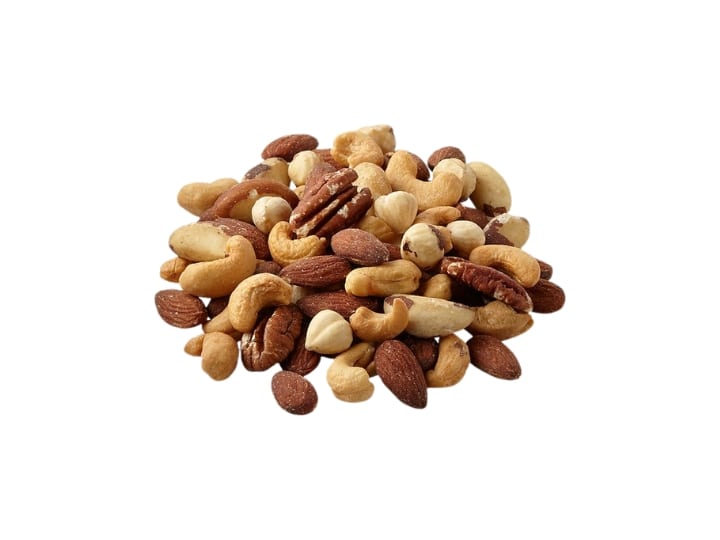
Nutritional Info for 100g:
- 607 Calories
- 53.5g Fat
- 22.4g Carbs
- 5g Sugar
- 6.4g Fiber
- 19.5g Protein
While not technically a kind of nut, mixed nuts provide a good balance of protein, healthy fats, and nutrients from a range of different nuts mentioned here.
Mixes can also contain protein-rich seeds like flax seeds, pumpkin seeds, and sesame seeds, as well as nutritious add-ons like dried fruit or yogurt melts, making them one of the healthiest snacks you can eat.
The nutritional info listed above is just an average for most mixed nuts you'll find in stores. So, make sure to take a look at each individual bag you find to see how it stacks up.
5. Cashews
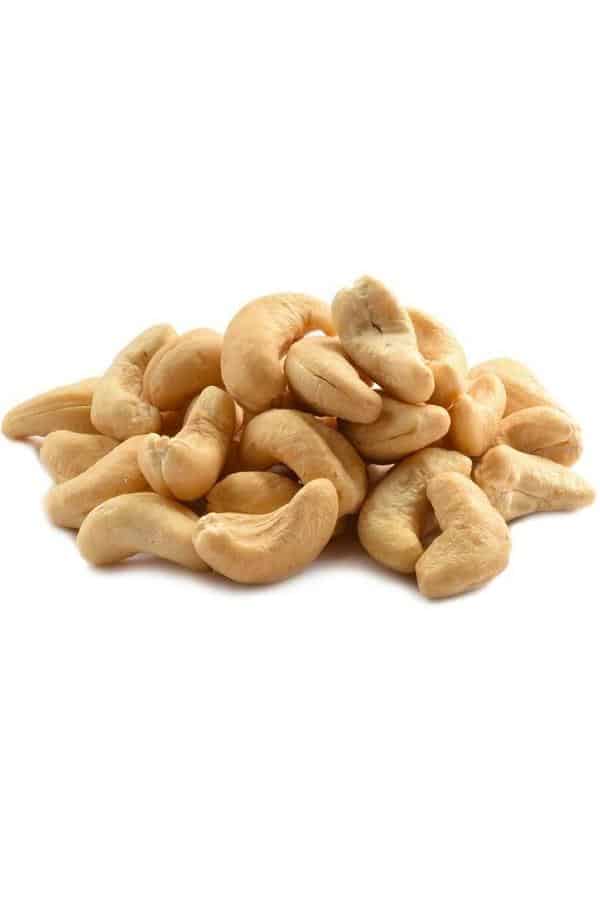
Nutritional Info for 100g, dry roasted:
- 574 Calories
- 46.4g Fat
- 32.7g Carbs
- 5g Sugar
- 3g Fiber
- 15.3g Protein
This high-protein nut is technically not a nut but a large seed from the cashew apple. They're packed with protein, B vitamins, and minerals and are rich in monounsaturated fatty acids and magnesium, which can help prevent heart disease and stroke by reducing cholesterol.
Because of their high starch and fat content, cashews become perfectly thick and smooth when blended, making them a popular choice for nut butter or as an alternative to cheese or cream in thickening sauces. You can buy cashews raw or roasted, though most raw cashews you'll see on store shelves are actually steamed first to remove urushiol, a substance in truly raw cashews that causes the skin reaction to poison ivy.
6. Walnuts

Nutritional Info for 100g:
- 654 Calories
- 65.2g Fat
- 13.7g Carbs
- 2.6g Sugar
- 6.7g Fiber
- 15.2g Protein
You might have heard the old wives' tale that walnuts are good for the brain because they resemble one, but there's actually some truth to it. Walnuts are a good source of protein and are high in manganese, which are both essential for healthy brain and nervous system functions. They're also full of omega-3s and antioxidants that protect brain cell health and slow cognitive decline.
Walnuts are a delicious snack on their own but can also be added to other dishes and desserts. One of my favorite ways to enjoy chopped walnuts is in this restaurant-style honey walnut shrimp recipe.
7. Hazelnuts
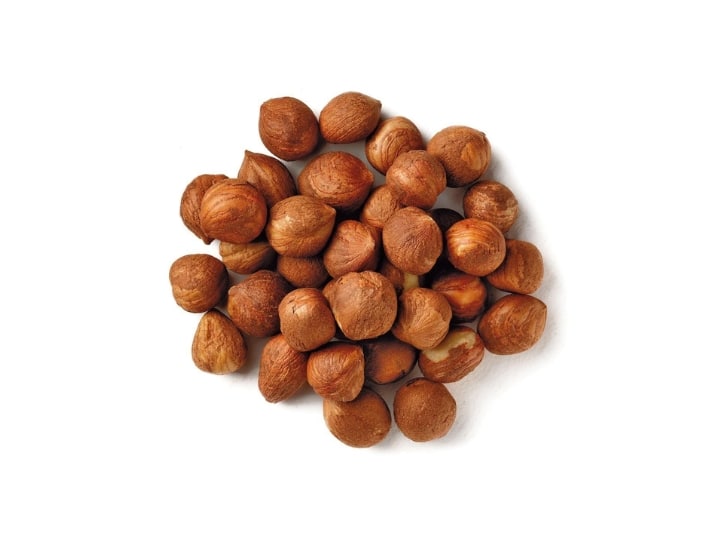
Nutritional Info for 100g:
- 628 Calories
- 60.8g Fat
- 16.7g Carbs
- 4.3g Sugar
- 9.7g Fiber
- 15g Protein
In addition to providing a percent of the daily recommended protein intake, hazelnuts are heart-healthy, full of dietary fiber, and rich in essential amino acids. They're also rich in vitamin E, an important nutrient and antioxidant that's necessary for immune health and promotes healthy skin, hair, and eyes.
Probably one of the most famous uses for hazelnuts is in Nutella spread, and you can make a healthier homemade version of it with real hazelnuts using my recipe here.
8. Brazil nuts
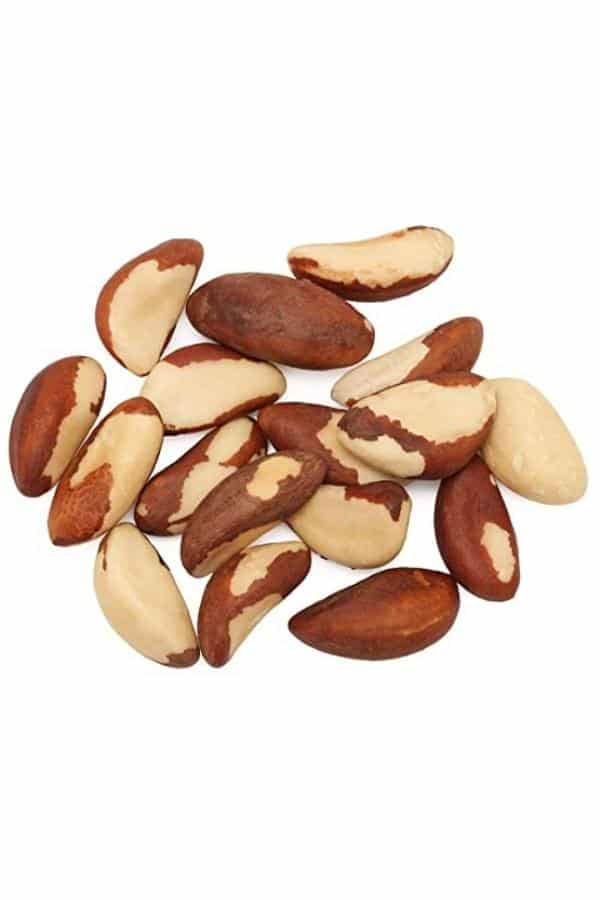
Nutritional Info for 100g:
- 659 Calories
- 67.1g Fat
- 11.7g Carbs
- 2.3g Sugar
- 7.5g Fiber
- 14.3g Protein
Though brazil nuts contain more protein per ounce than other nuts, it's important to keep your intake at a maximum of three brazil nuts per day due to their incredibly high selenium content.
Just one brazil nut contains around 175% of the daily value of selenium, a powerful mineral that plays a significant role in metabolism and thyroid function as well as helps boost the immune system, protect heart health, and reduce age-related cognitive decline. Too much of it though, can lead to some health problems, which is why one or two of these delicious tree nuts is more than enough.
9. Pine nuts
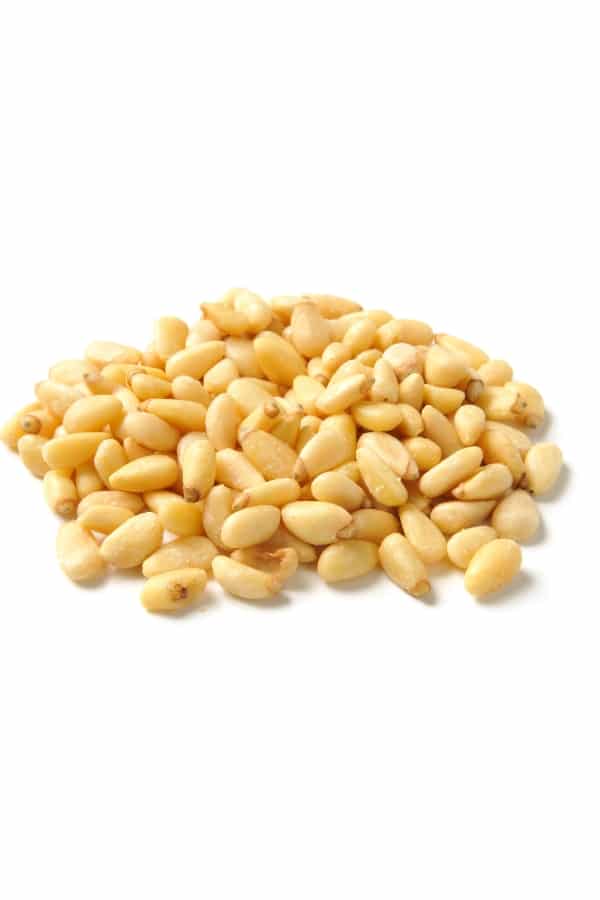
Nutritional Info for 100g, dried:
- 673 Calories
- 68.4g Fat
- 13.1g Carbs
- 3.6g Sugar
- 3.7g Fiber
- 13.7g Protein
Protein is just as beneficial for your skin as it is for the rest of your body, and pine nuts are rich in several nutrients that add on to these benefits even more. Pine nuts are high in vitamin E, vitamin K, zinc, and manganese, four nutrients that are all important for skin health, assisting in wound healing and collagen production.
Pine nuts are a favorite ingredient for traditional pesto, adding a thicker texture and savory nuttiness. You can also add a handful of toasted pine nuts to your salad, pasta, or desserts for a nice crunch and a more layered flavor.
10. Pili Nuts
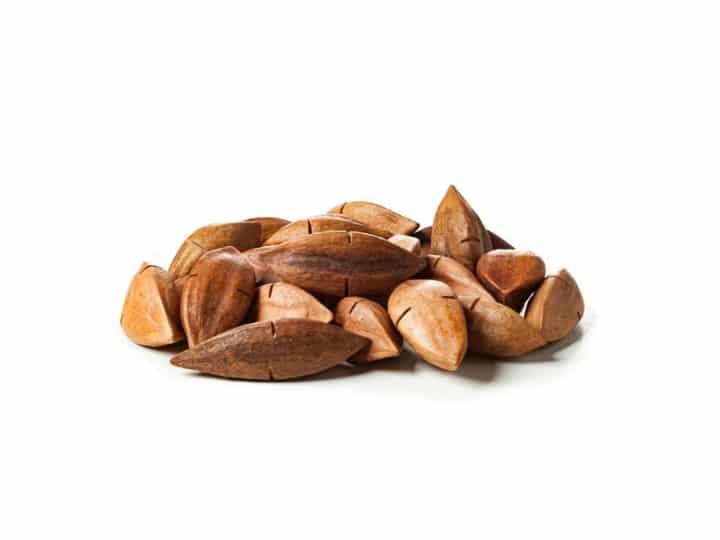
Nutritional Info for 100g:
- 700 Calories
- 80g Fat
- 4g Carbs
- 0g Sugar
- 4g Fiber
- 10g Protein
If you love nuts that have a creamy buttery flavor to them, then you'll pili nuts.
On top of being absolutely delicious they're a nutritional power house. They're loaded with magnesium and vitamin E and even a decent amount of protein - 10g in every 100g serving. Not to mention, they're the best nut to eat if you're following a low carb diet like keto since they have 0 net carbs.
With that said, they can be tough to find in stores. So, if you'd like to pick a bag up you can grab one here.
11. Pecans
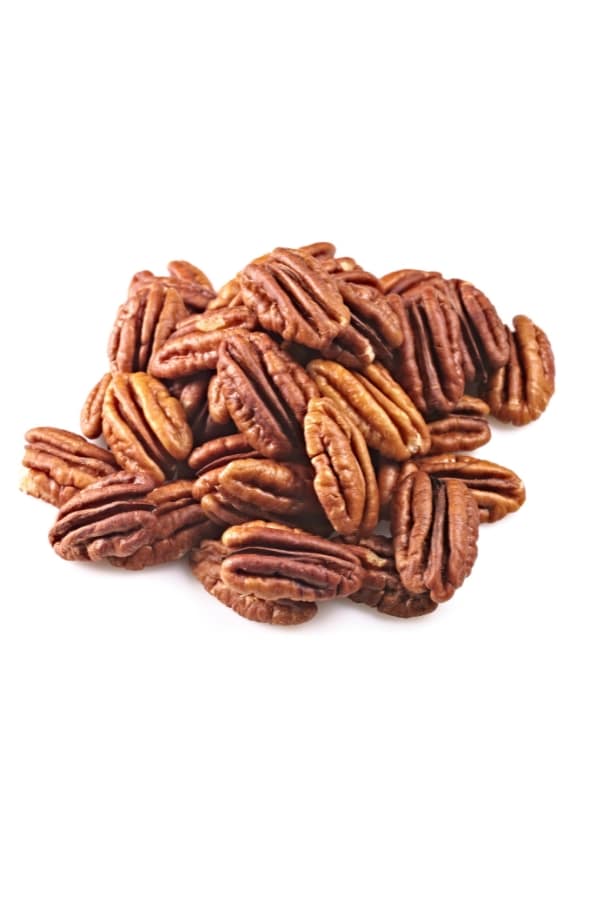
Nutritional Info for 100g, dry roasted:
- 710 Calories
- 74.3g Fat
- 13.6g Carbs
- 4.1g Sugar
- 9.4g Fiber
- 9.5g Protein
Prized for their sweet fragrance, mellow flavor, and rich crunch, pecans are a delicious nut that's full of protein and health benefits. They're a great source of fiber, with a third of the daily recommended dose in 100-grams, and are full of health healthy omega-3s.
There are so many ways to enjoy these flavorful tree nuts, but my favorites are these low sugar candied pecans and pecan pralines. The simple ingredients really let their natural taste and texture shine.
12. Macadamia nuts
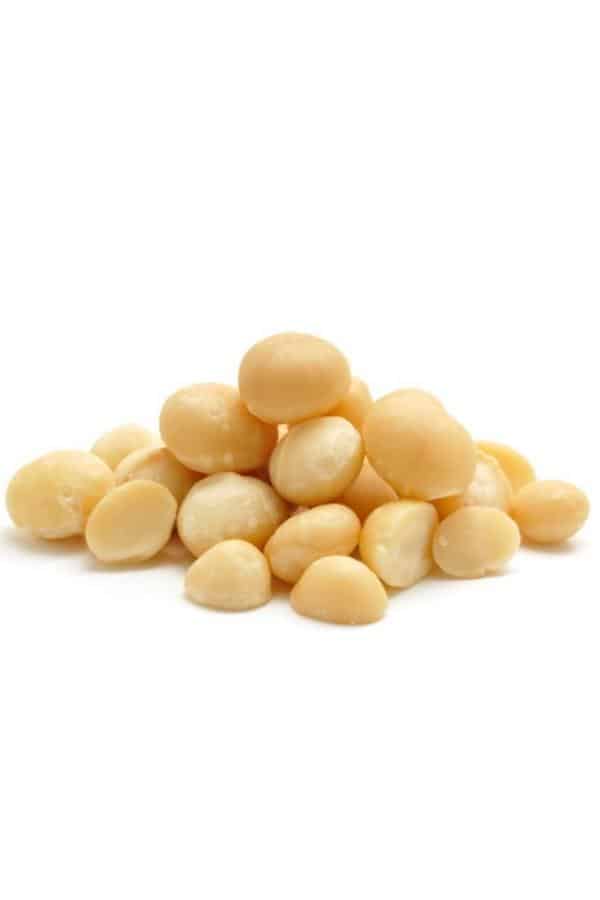
Nutritional Info for 100g:
- 718 Calories
- 75.8g Fat
- 13.8g Carbs
- 4.6g Sugar
- 8.6g Fiber
- 7.9g Protein
Macadamia nuts are most well known for having an incredibly buttery taste and texture, owing to their high content of healthy fats. They also pack a decent amount of protein per serving and make an excellent snack for a midday protein boost. Their most notable nutritional benefit is their high thiamine content, an essential B vitamin that supports the metabolism, nerve, muscle, and heart functions.
These richly flavorful nuts are especially delicious in white chocolate macadamia nut cookies, but are also really great on their own.
13. Chestnuts
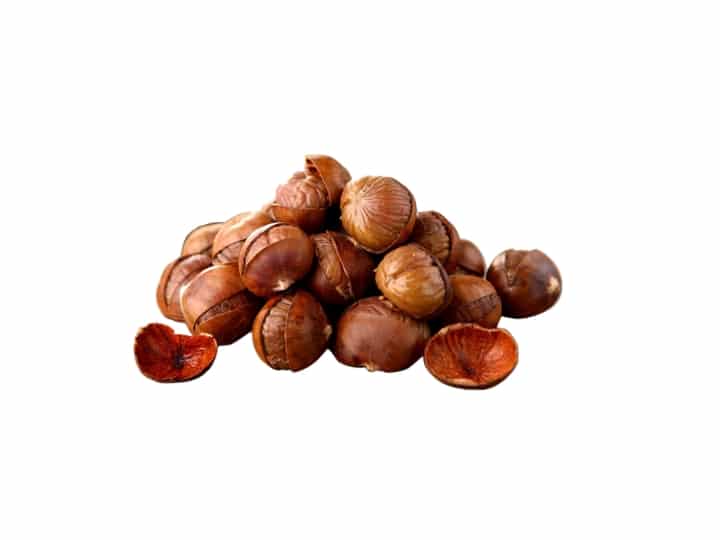
Nutritional Info for 100g, roasted:
- 245 Calories
- 2.2g Fat
- 53g Carbs
- 10.6g Sugar
- 5.1g Fiber
- 3.2g Protein
This Christmas-time favorite is a low-calorie nut that packs a little bit of healthy protein. What really sets them apart from other nuts on the list is that they're the only nuts that contain vitamin C, with a 100-gram serving providing a third of the daily value.
Hands down, the most popular way to enjoy them is roasted, but they can also be made into flour, added to pastries, or even eaten raw for more vitamin C content.



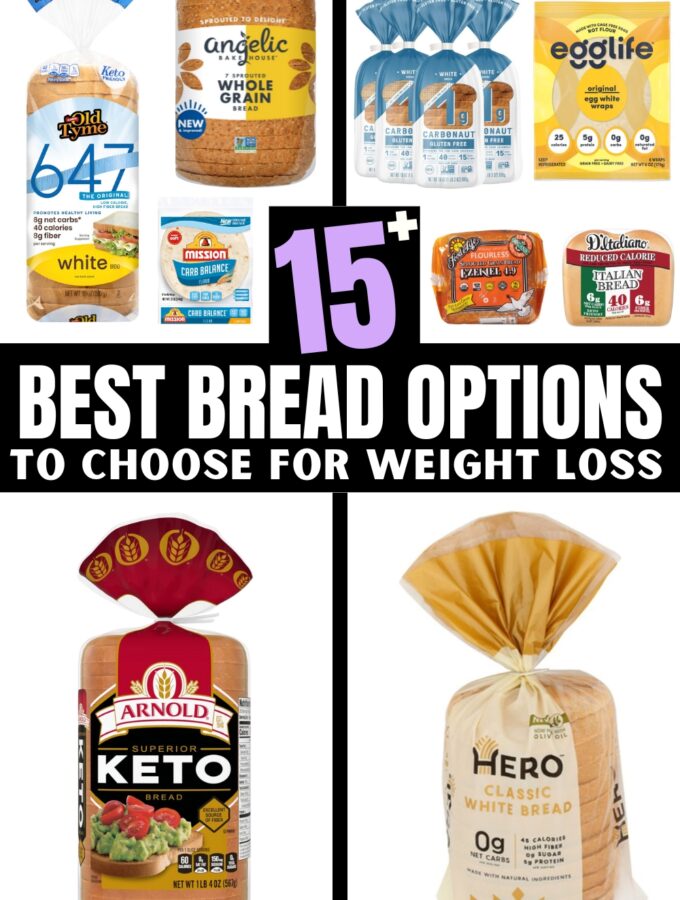

Leave a Reply